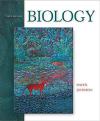1
A) the area a species can occupy in the face of exploitive competition B) the habitat of a species within a community resulting from clumping C) the habitat that exists in nature as opposed to the ideal D) the life pattern that the organism actually assumes 2
A) the more abundant species will exclude the less abundant species through competition B) competition for the same resources excludes species having different life styles C) no two species can occupy the same niche indefinitely when resources are limited D) larger organisms exclude smaller ones through competition as in the case of large trees controlling underbrush 3
A) vitalism B) mutualism C) parasitism D) commensalism 4
A) ectoparasitism B) endoparasitism C) parasitoids D) brood parasitism 5
A) dystrophic B) oligotrophic C) eutrophic D) ecotrophic 6
A) Mullerian mimicry B) secondary compounds C) aposematic coloration D) cryptic coloration E) Batesian mimicry 7
A) Beltian bodies B) primary compounds C) aposematic coloration D) cryptic coloration E) epiphytes 8
A) primary compound B) secondary compound C) cactus spine D) all of the above E) none of the above 9
A) make up a single population B) use the redwoods for food C) have identical geographic distributions D) have the same evolutionary history E) have niches that overlap 10
A) monarch butterflies B) lichens C) mycorrhizae D) tapeworms and humans E) clownfish and sea anemones 11
A) milkweeds and monarchs B) Mullerian mimicry C) mutualism D) all of the above are examples of coevolution E) none of the above is an example of coevolution 12
A) Beltian bodies B) mustard oils C) epiphytes D) "honeydew" E) silica 13
A) cardiac glycosides B) stipules C) mustard oils D) all of the above E) none of the above 14
A) character displacement B) competitive exclusion C) predation D) exploitative competition E) interference competition 15
A) primary compounds tend to be more toxic than secondary compounds B) secondary compounds are toxic to all herbivores C) algae as well as plants produce toxic chemical compounds D) herbivores that can tolerate a particular secondary compound usually feed on a wide variety of plant species E) all of the above are true 16
A) they incorporate the toxic chemicals from the milkweed they eat B) they produce their own secondary compounds C) they break down the toxic chemicals from the milkweed they eat D) monarch butterflies are not toxic; they only look that way 17
A) contains toxic chemicals B) is palatable to predators C) eats plants that have secondary compounds D) is part of a Batesian mimicry system E) is part of a Mullerian mimicry system 18
A) keystone species B) ecosystem productivity C) species diversity D) species richness E) spatial heterogeneity 19
A) the predator must be able to learn to recognize the model B) the model must outnumber the mimic C) both of the above D) none of the above 20
A) Oligotrophic lakes contain more nutrients than eutrophic lakes. B) Xerarch succession is primary succession that occurs in salt-water environments. C) Most ecologists believe that most communities achieve a stable, unchanging climax vegetation. D) A mature ecosystem has greater species richness, greater biomass, and less net productivity than a younger stage of succession. E) Tolerance, facilitation and inhibition occur only in the very earliest of successional stages and are associated with R-selected species. 21
A) commensalism B) cryptic coloration C) parasitism D) Batesian mimicry E) Mullerian mimicry 22
A) sympatric species B) allopatric species C) island biogeography D) primary succession E) secondary succession 23
A) in a parasitic relationship, both organisms are harmed B) symbiotic organisms have usually undergone little or no coevolution C) a relationship that appears to be commensalistic may in fact be mutualistic or parasitic D) the most efficient type of parasite is one that kills its host E) none of the above is true 24
A) barnacles B) flour beetles C) paramecia D) all of the above E) none of the above 25
A) a specialized structure for morphological defense found in certain types of acacia trees B) protein-rich structures found at the tips of leaflets of some types of acacia trees C) specialized structures that prevent anemone fish from being stung by the anemones with which they associate D) modified body structures commonly found in internal parasites but not in external parasites E) specialized organs in poison ivy that produce secondary compounds 26
A) population pressure B) carrying capacity C) coevolution D) allopatric speciation 27
A) True B) False 28
A) True B) False 29
A) Mullerian mimicry B) Batesian mimicry C) cryptic coloration D) disruptive coloration 30
A) True B) False 31
A) keystone species B) niche C) competitor D) predator 32
A) predation/parasitism B) commensalism C) amensalism D) competition 33
A) niche differentiation B) contest competition C) interference competition D) scramble competition 34
A) predation B) commensalism C) competition D) brood parasitism 35
A) True B) False 36
not contribute to the rapid loss of nutrients from terrestrial ecosystems?A) clear-cutting native forest B) early seral stages C) climax communities D) low diversity 37
A) a fundamental niche B) competition C) commensalism D) mutualism E) parasitism 38
A) True B) False 39
A) True B) False 40
A) True B) False 41
A) True B) False



 2002 McGraw-Hill Higher Education
2002 McGraw-Hill Higher Education

 2002 McGraw-Hill Higher Education
2002 McGraw-Hill Higher Education